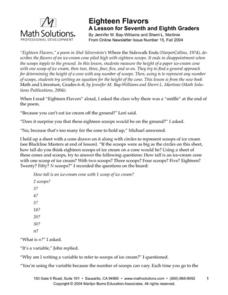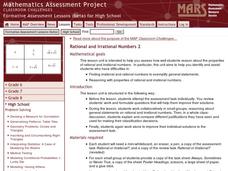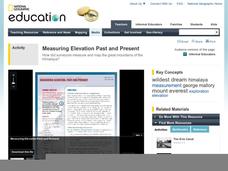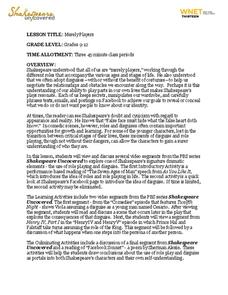Curated OER
The Ethics of Outsourcing to China
After viewing clips from a documentary on factory work in China and US outsourcing, learners have a fishbowl discussion. They work in groups to build both personal points of view and strong arguments on the effects of outsourcing in...
Marilyn Burns Education Associates
Eighteen Flavors
Your learners will be tantalized by this inquiry-based, collaborative activity as they discover how to write an equation that represents the height of an ice cream cone. Given the scenario based on the poem, "Eighteen Flavors," and...
Discovery Education
The Everyday Science of Sports
Physical science juniors will enjoy this sensational enrichment on aerodynamics, especially if they are also sports fans! With a focus on physical features and behaviors, collaborative groups make observations on five different golf...
Curated OER
Rational and Irrational Numbers 2
Is the circumference of a circle always, sometimes, or never rational? Learners answer questions individually and also work in groups to look at sums and products of rational and irrational numbers. They must also be able to use the...
EngageNY
Launching Readers Theater Groups: Identifying Passages from Esperanza Rising for Readers Theater that Connect to the UDHR
Teach young readers how to compare two texts and select passages that exemplify a specific theme with Lesson 6 from Unit 3. Begin by modeling how an expert reader selects examples from a text, performing a think aloud on how Article 2 of...
Curated OER
Persuasion as Text: Organizational, Grammatical, and Lexical Moves in Barbara Jordan’s "All Together Now"
A thorough lesson on persuasive writing takes middle schoolers through several activities, including group discussion, collaborative posters, and independent writing. They compare historical speeches and analyze the persuasive techniques...
EngageNY
Close Reading of That Book Woman: How Did People Access Books in Rural Areas of the United States?
For this ninth lesson plan in a larger beginning-of-the-year unit, close reading skills are used independently to find the gist of the story That Book Woman. Rereading for important details is the targeted skill to unlock a deeper...
EngageNY
Writing to Inform: Colonial Trades
Fourth graders who are studying life in colonial America engage in an instructional activity that has them create a "Help Wanted" ad that would have been written by a master craftsperson from back in the day. They utilize a graphic...
Curated OER
Bog Child
You are destined for an engaged and happy class as they read Siobhan Dowd’s Bog Child because there is nothing missing from this study guide, seriously. This might be the easiest novel to teach because you don’t have to do a thing in...
Curated OER
Rational and Irrational Numbers 1
You'll need scissors, glue sticks, and mini whiteboards for this activity on rational and irrational numbers. Learners work in groups to classify a variety of expressions as rational or irrational. They are also given a mock discussion...
Delaware Math Cadre Elementary Committee
Operations and Algebraic Thinking
How to use the relationship between multiplication and division to solve math word problems is the focus of the lesson presented here. In it, fourth graders work in groups to solve problems posed by the teacher. Then, each group is given...
National Center for Case Study Teaching in Science
A Tale of Two Houses
Does it cost more per year to heat Bill's home in North Dakota or to cool Bubba's home in Georgia? Using heat transfer concepts, mathematical equations, and critical thinking skills, young engineers work in groups to determine who is...
Inter-American Magnet School
The Inca Projecta
Here is a wonderful idea, intended for learners in a collaborative multi-grade setting. While learners of different grades focus on different aspects of the same project, all their efforts culminate in a time tunnel, where they turn...
Perkins School for the Blind
Tactile quilts that tell a story
Learners with multiple disabilities need to engage in projects that push them to know their full potential. They need to be able to express themselves in a variety of ways, and this very thoughtful lesson does just that. They make a...
National Geographic
Measuring Elevation Past and Present
After viewing a short video about a climb up Mount Everest, high schoolers read about triangulation for measuring distant elevations. Have your class work in groups to construct an inclinometer and then use it to measure the height of...
EngageNY
Continued Close Reading of Bullfrog at Magnolia Circle: Text-Dependent Questions and Vivid Words and Phrases
As 3rd graders continue reading Bullfrog at Magnolia Circle, they focus on the concepts of predator and prey in the fifth lesson plan of this unit. Scholars further develop their ability to answer questions using evidence from the text...
EngageNY
Continued Close Reading of Bullfrog at Magnolia Circle: Text-Dependent Questions and Vivid Words and Phrases
In the third activity from this unit based on the book Bullfrog at Magnolia Circle, learners focus on using specific details from the text-to-answer questions about the habitat of bullfrogs. While reading the text, young...
Northwest Career & Technical Academy Foundation
Stand Up. . . Be InCtrl!
What is the difference between a bystander and an upstander? A collaborative project created through digital media helps the class understand that they can participate in an online community respectfully and responsibly. They consider...
Illustrative Mathematics
What is a Trapezoid? (Part 2)
This collaborative activity investigates the meaning of a trapezoid and a parallelogram. It begins by presenting two different definitions of a trapezoid. Learners are to reason abstractly the difference between the two definitions and...
Baylor College
Serving Sizes
Are serving sizes for different foods always appropriate for what you need? In this hands-on activity, learners work in groups to estimate what one serving size of various foods are, and then evaluate their hypotheses by measuring...
Curated OER
Merely Players
Disguises and role playing are the focus of a resource that uses Shakespeare’s As You Like It, Twelfth Night, and Henry IV, Part I, to demonstrate how we all play many parts in our lives; how we all are “merely players.” The many...
Institute of Electrical and Electronics Engineers
Working with Watermills
In collaborative groups, emerging engineers or environmental scientists plan and construct a water wheel or watermill that rotates for a total of three minutes. Everything you need to carry out this instructional activity is included:...
Institute of Electrical and Electronics Engineers
Exploring at the Nanoscale
Nano-nano! Nanotechnology can seem like it's from another planet! After learning about this tiny technology, collaborative groups experiment with how smaller particles affect chemical reactions. They do this by immersing a whole and a...
Curated OER
Modals
Verbs can be tricky, especially those modal verbs of probability. Take a look at a wonderful 16-page workbook that uses think-pair-share, critical thinking, skills practice, and discussion to assist learners in using the correct modal...

























